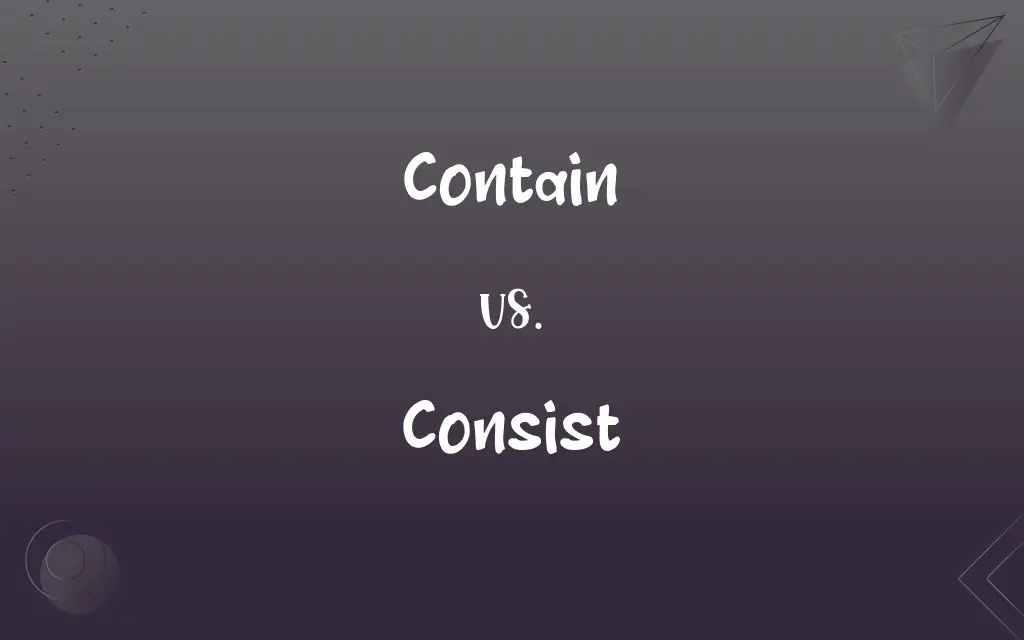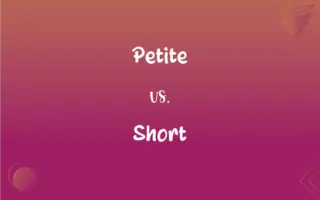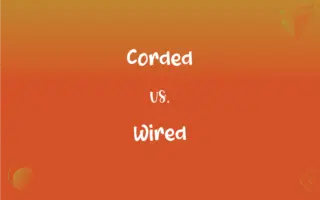Contain vs. Consist: What's the Difference?
Edited by Janet White || By Harlon Moss || Updated on November 3, 2023
Contain means to hold or include within a space or composition, while consist means to be made up of components or elements.

Key Differences
The concept of containment implies an entity holding or including something within its limits or boundaries. For example, a container can hold a liquid, or a list can contain items. Consist, however, is used to describe the composition of the entity itself, indicating what it is made up of without suggesting confinement. An item that consists of several materials is made up of those materials without implying they are held within.
Contain can also suggest control or restraint, implying that what is contained is kept within bounds and may otherwise expand or spread. In contrast, to consist does not carry this implication of control, but rather a statement of fact about the elements that form a whole. For instance, a zoo contains animals, potentially suggesting restraint, whereas a forest consists of trees, implying no such control.
In the context of ingredients or components, contain emphasizes the inclusion of elements as part of a larger whole. A recipe might contain nuts, which implies that nuts are included among other ingredients. When we say a dish consists of certain ingredients, we are detailing what the entire dish is made up of, often without focusing on any one component.
In scientific and technical writing, contain can imply a system that has capacity or features that include certain elements or variables. A database contains records; it is designed to hold this information. When we say a process consists of several steps, we're outlining the sequence that makes up the whole process without the connotation of enclosure or capacity.
Contain may also have an emotional connotation, as in containing one's emotions, which suggests keeping them within oneself and not letting them show. Consist lacks this emotional aspect and is used more objectively to describe the elements that make up an emotional experience or concept, such as "Happiness consists in appreciating the little things in life."
ADVERTISEMENT
Comparison Chart
Definition
To hold or have within
To be made up of
Implication of Restraint
Implies control or restraint
Lacks implication of control
Usage in Composition
Emphasizes inclusion within a larger whole
Details elements forming the entire whole
Emotional Connotation
Can suggest keeping emotions controlled
Describes elements of a concept objectively
In Containers
Refers to what a container holds
Describes what a substance is made of
ADVERTISEMENT
Contain and Consist Definitions
Contain
To restrain or hold back.
She struggled to contain her laughter.
Consist
To exist or have as an essential feature.
The beauty of the landscape consists in its simplicity.
Contain
To be capable of holding.
The jug contains a liter of milk.
Consist
To be based on or founded.
The agreement consists in mutual respect and understanding.
Contain
To have something within.
The box contains old photographs.
Consist
To be composed or made up of.
The dessert consists mainly of fruits and nuts.
Contain
To prevent the spread of something.
The firefighters worked to contain the blaze.
Consist
To be made up or composed.
The committee consists of five members.
Contain
To include as a part.
The course contains several modules on ethics.
Consist
To be inherent or characteristic.
True bravery consists in acting without fear of danger.
Contain
To have within; hold
A bin that contains rice.
Consist
To be made up or composed
New York City consists of five boroughs. See Usage Note at include.
FAQs
Does consist imply emotional restraint?
No, consist does not imply emotional restraint.
Can contain suggest a limit to quantity?
Yes, contain can suggest a limit to what can be held within a space.
Does contain imply physical boundaries?
Yes, contain often implies physical boundaries within which something is held.
Can both words be used interchangeably?
No, contain and consist are not interchangeable as they have different meanings.
Does consist indicate quantity?
No, consist indicates what makes up the entity, not the quantity.
Can consist be used to describe physical composition?
Yes, consist describes the physical composition of something.
Is contain used in the context of emotions?
Yes, contain can be used to describe controlling or restraining emotions.
Does contain have a synonym?
Yes, synonyms for contain include hold, enclose, and include.
Does contain imply control over what’s inside?
Yes, contain can imply control over the contents.
Can a diet consist of certain foods?
Yes, a diet can consist of certain foods, indicating its composition.
Is contain used when listing ingredients in a recipe?
Yes, when highlighting specific ingredients, a recipe can say it contains them.
Can consist be used to describe the outcome of a process?
Yes, the outcome of a process can consist of various results.
Can a box consist of cardboard?
Yes, a box can consist of cardboard, meaning it's made up of cardboard.
Would consist be used for an entire recipe?
Yes, to describe the full makeup of a recipe, you'd say it consists of certain ingredients.
What’s a synonym for consist?
A synonym for consist is composed.
Can a movie contain or consist of certain themes?
A movie can contain themes as elements within it, while its character might consist of those themes.
Is contain more active than consist?
Contain can be seen as more active because it suggests the act of holding or including.
Is consist passive in nature?
Yes, consist is more descriptive and passive, not suggesting an action.
Does a playlist contain or consist of songs?
A playlist contains songs as a part of its compilation.
Does contain imply a mixture?
Contain does not necessarily imply a mixture but does imply inclusion.
About Author
Written by
Harlon MossHarlon is a seasoned quality moderator and accomplished content writer for Difference Wiki. An alumnus of the prestigious University of California, he earned his degree in Computer Science. Leveraging his academic background, Harlon brings a meticulous and informed perspective to his work, ensuring content accuracy and excellence.
Edited by
Janet WhiteJanet White has been an esteemed writer and blogger for Difference Wiki. Holding a Master's degree in Science and Medical Journalism from the prestigious Boston University, she has consistently demonstrated her expertise and passion for her field. When she's not immersed in her work, Janet relishes her time exercising, delving into a good book, and cherishing moments with friends and family.































































